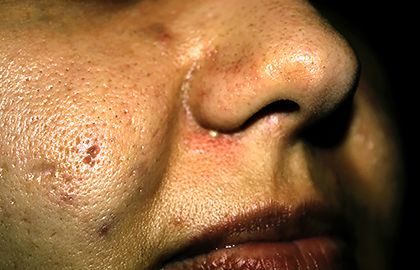
Why Facial Skin Pores Expand: Prevention and Care
Facial pores are tiny openings on the skin that serve as an outlet for sweat, oil, and other substances produced by our skin. These pores can appear larger or more prominent due to various factors, causing many individuals to become self-conscious about their skin's appearance. Understanding why facial pores expand and how to prevent and care for them is essential for maintaining healthy and radiant skin.
Genetics:
The size of our facial pores is largely determined by genetics. Some individuals naturally have larger pores, while others have smaller ones. Unfortunately, we can't change our genetic makeup, but we can still minimize the appearance of enlarged pores through proper care and prevention techniques.
Excessive Sebum Production:
Sebum is an oily substance produced by the sebaceous glands in our skin. When sebum production becomes excessive, it can mix with dead skin cells and other debris, leading to clogged pores and causing them to appear larger. This is especially common for individuals with oily skin types.
Aging:
As we age, the skin loses its elasticity and collagen, resulting in a loss of support for the surrounding tissues. This can cause the pores to become more noticeable and appear enlarged. Additionally, the accumulation of sun damage over the years can further contribute to the appearance of enlarged pores.
Sun Damage:
Excessive exposure to the sun's harmful UV rays can damage the collagen and elastin fibers in our skin. When these fibers break down, the skin becomes less firm and loses its ability to contract around the pores. As a result, the pores may appear larger and more prominent.
Prevention and Care:
Cleanse Regularly:
Proper cleansing is crucial for maintaining healthy pores. Use a gentle cleanser twice a day to remove excess oil, dirt, and impurities from your skin. Avoid harsh cleansers or scrubbing vigorously, as this can irritate the skin and potentially make the pores more noticeable.
Exfoliate:
Regular exfoliation helps remove dead skin cells and unclogs pores, reducing their appearance. Choose a gentle exfoliator that suits your skin type and use it 1-2 times a week. Avoid over-exfoliating, as this can strip away the skin's natural oils and cause irritation.
Moisturize:
Keeping the skin well-hydrated is essential for maintaining its elasticity and minimizing the appearance of pores. Use a lightweight, oil-free moisturizer that suits your skin type to keep it balanced and hydrated.
Sun Protection:
Protecting your skin from the sun is crucial for overall skin health and pore maintenance. Apply a broad-spectrum sunscreen with an SPF of 30 or higher every day, even during cloudy or winter days. This helps prevent sun damage and reduces collagen breakdown, keeping the skin firm and the pores less noticeable.
Professional Treatments:
If you're struggling with enlarged pores, consider consulting a dermatologist or esthetician for professional treatments. Some options include chemical peels, microdermabrasion, laser treatments, and retinoid creams. These treatments can help improve the appearance of pores by stimulating collagen production, reducing oil production, and promoting skin cell turnover.
In conclusion, enlarged facial pores can be a common concern for many individuals. While we can't change our genetic predisposition, we can take steps to prevent and care for enlarged pores. By following a consistent skincare routine, protecting our skin from sun damage, and seeking professional treatments when necessary, we can minimize the appearance of enlarged pores and achieve healthier, smoother-looking skin. Remember, embracing and caring for your unique skin is the key to feeling confident and beautiful.